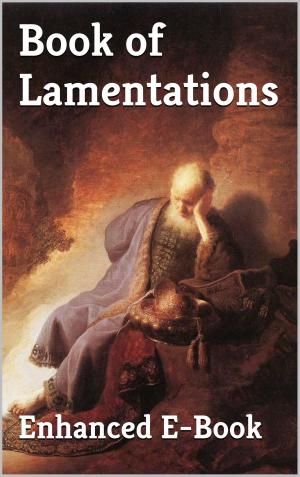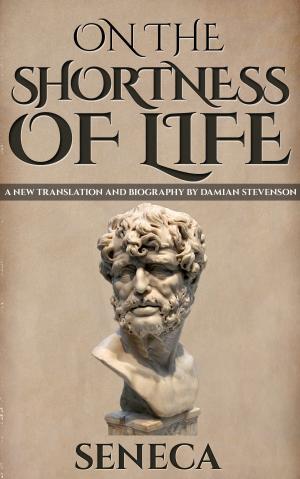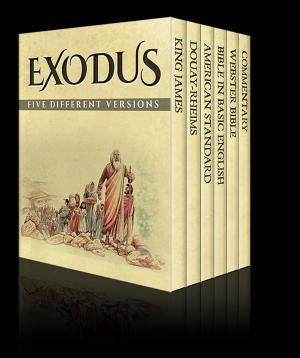Leviticus - Enhanced E-Book Edition
Five Different Versions, Matthew Henry Commentary, Image Gallery and Audio Link
Nonfiction, Religion & Spirituality, Bible & Bible Studies, Bibles, King James, Old Testament, Study, Other Bibles| Author: | Moses, God | ISBN: | 1230000221596 |
| Publisher: | Enhanced E-Books | Publication: | February 27, 2014 |
| Imprint: | Language: | English |
| Author: | Moses, God |
| ISBN: | 1230000221596 |
| Publisher: | Enhanced E-Books |
| Publication: | February 27, 2014 |
| Imprint: | |
| Language: | English |
Leviticus is the third book of the Hebrew Bible, and the third of five books of the Torah (or Pentateuch). It is founded on two crucial beliefs: the first, that the world was created "very good" and retains the capacity to achieve that state although it is vulnerable to sin and defilement; the second, that the faithful enactment of ritual makes God’s presence available, while ignoring or breaching it compromises the harmony between God and the world.
The traditional view is that Leviticus was compiled by Moses, or that the material in it goes back to his time, but internal clues suggest that it originated in post-exilic (i.e., after c.538 BCE) Jewish worship centred on reading or preaching. Scholars are practically unanimous that the book had a long period of growth, that it includes some material of considerable antiquity, and that it reached its present form in the Persian period (538–332 BCE).
The core ideas around which Leviticus develops are the holy character of God and the will of God for Israel’s holiness. God’s holiness, mankind’s sinfulness, sacrifice, and God’s presence in the sanctuary are the book’s most common themes. With a clear, authoritative tone, the book sets forth instruction toward personal holiness at the urging of God.
Leviticus is presented here in stunning E-book format. It includes five different versions, a gallery of art inspired by the book over the ages featuring work from William Blake, Benjamin West, Nicholas Poussin and other renowned artists. There is also chapter and verse commentary from Matthew Henry and links to free complete audio recordings of different versions of 'Leviticus.'
The King James Version
Douay-Rheims Version
The American Standard Version
Bible in Basic English Version
Webster Bible Version
Image gallery
Matthew Henry Commentary
Links to free complete audio recordings of 'Leviticus'
*Individual Table of Contents for each version.
*Perfect formatting in rich text.
Leviticus is the third book of the Hebrew Bible, and the third of five books of the Torah (or Pentateuch). It is founded on two crucial beliefs: the first, that the world was created "very good" and retains the capacity to achieve that state although it is vulnerable to sin and defilement; the second, that the faithful enactment of ritual makes God’s presence available, while ignoring or breaching it compromises the harmony between God and the world.
The traditional view is that Leviticus was compiled by Moses, or that the material in it goes back to his time, but internal clues suggest that it originated in post-exilic (i.e., after c.538 BCE) Jewish worship centred on reading or preaching. Scholars are practically unanimous that the book had a long period of growth, that it includes some material of considerable antiquity, and that it reached its present form in the Persian period (538–332 BCE).
The core ideas around which Leviticus develops are the holy character of God and the will of God for Israel’s holiness. God’s holiness, mankind’s sinfulness, sacrifice, and God’s presence in the sanctuary are the book’s most common themes. With a clear, authoritative tone, the book sets forth instruction toward personal holiness at the urging of God.
Leviticus is presented here in stunning E-book format. It includes five different versions, a gallery of art inspired by the book over the ages featuring work from William Blake, Benjamin West, Nicholas Poussin and other renowned artists. There is also chapter and verse commentary from Matthew Henry and links to free complete audio recordings of different versions of 'Leviticus.'
The King James Version
Douay-Rheims Version
The American Standard Version
Bible in Basic English Version
Webster Bible Version
Image gallery
Matthew Henry Commentary
Links to free complete audio recordings of 'Leviticus'
*Individual Table of Contents for each version.
*Perfect formatting in rich text.















